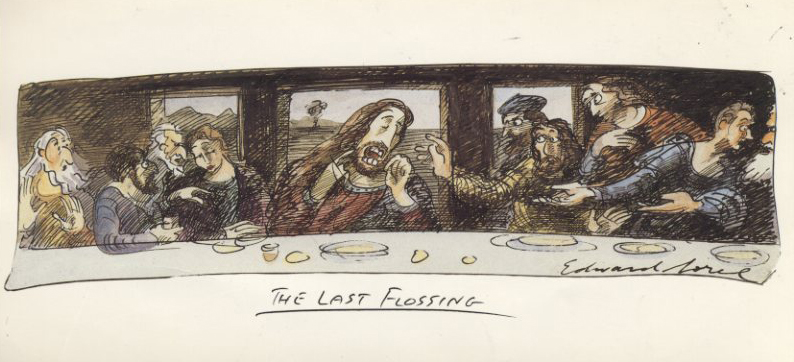March 26
Richard Dawkins
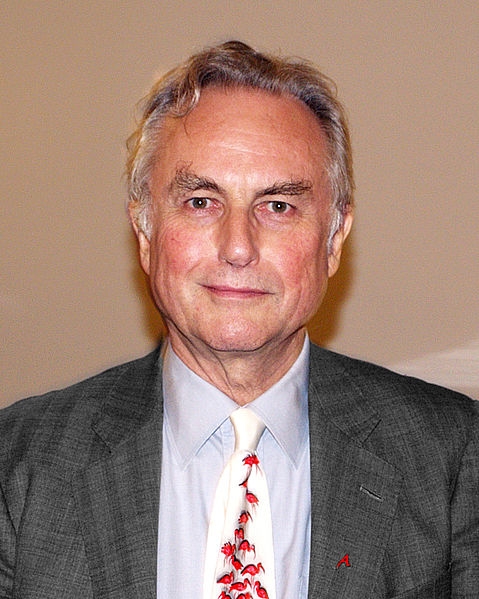
On this date in 1941, evolutionary biologist and freethought champion Clinton Richard Dawkins was born in Nairobi, Kenya. His father, Clinton John Dawkins, was an agricultural civil servant in the British Colonial Service and served with the King’s African Rifles in World War II. The family returned to England in 1949. Dawkins graduated from the University of Oxford in 1962, then earned a philosophy doctorate and became an assistant professor of zoology at the University of California-Berkeley in 1967-69 and a Fellow of New College-Oxford in 1970.
Dawkins served as Charles Simonyi Chair of Public Understanding of Science at Oxford University from 1995-2008. In 2011 he joined the professoriate of the New College of the Humanities, founded by A.C. Grayling in London. He was elected a Fellow of the Royal Society of Literature in 1997 and a Fellow of the Royal Society of London for Improving Natural Knowledge in 2001.
The Selfish Gene, his first book, published in 1976, became an international best-seller. It was followed by The Extended Phenotype (1982), The Blind Watchmaker (1986), River Out of Eden (1995), Climbing Mount Improbable (1996), Unweaving the Rainbow (1998), A Devil’s Chaplain (2003) and The Ancestor’s Tale (2004). His iconoclastic book, The God Delusion, which he wrote with the public hope of turning believing readers into atheists, was published in 2006 to much acclaim.
He also produced several television documentaries decrying religion’s influence, including “Root of All Evil?” (2006) and “The Enemies of Reason” (2007). “The Genius of Charles Darwin” followed in 2008 and “The Meaning of Life” (2012) explored the implications of living without religious faith. In his memoir An Appetite for Wonder: The Making of a Scientist (2013), Dawkins chronicled his life up to publication of The Selfish Gene. A second memoir, Brief Candle in the Dark: My Life in Science, was published in 2015.
He founded the nonprofit Richard Dawkins Foundation for Reason and Science in 2006. It merged with the Center for Inquiry in 2016. The foundation finances research on the psychology of belief and religion, funds scientific education programs and supports secular charitable groups. Dawkins has advanced the concept of cultural inheritance or “memes,” also described as “viruses of the mind,” a category into which he places religious belief. He has also advanced the “replicator concept” of evolution.
A passionate atheist, Dawkins coined the memorable term “faith-heads” to describe certain religionists. His remarks in The Guardian (Feb, 6, 1999), “I’m like a pit bull terrier being released into the ring, as a spectator sport, to attack religious people” led to the nickname “Darwin’s pit bull.” His column for The Observer (Dec. 30, 2001) pointed out, “We deliberately set up, and massively subsidise, segregated faith schools. As if it were not enough that we fasten belief labels on babies at birth, those badges of mental apartheid are now reinforced and refreshed. In their separate schools, children are separately taught mutually incompatible beliefs.”
Dawkins was named the British Humanist Association’s 1999 Humanist of the Year in 1999 and received the International Cosmos Prize two years before that. In 2001 he was the recipient of an Emperor Has No Clothes Award from the Freedom From Religion Foundation but was unable to accept it in person because flights were grounded after 9/11. His written remarks accepting it are here. He accepted it in person in 2012 at the national convention in Portland, Ore.
He has been married three times and has a daughter, Juliet, born in 1984. Dawkins and Lalla Ward, who illustrated several of his books and other works, announced an “entirely amicable” separation in 2016 after 24 years of marriage. That same year he suffered a minor hemorrhagic stroke but reported later in the year that he had almost completely recovered.
PHOTO: By David Shinbone under CC 3.0.
"My respect for the Abrahamic religions went up in the smoke and choking dust of September 11th. The last vestige of respect for the taboo disappeared as I watched the ‘Day of Prayer’ in Washington Cathedral, where people of mutually incompatible faiths united in homage to the very force that caused the problem in the first place: religion. It is time for people of intellect, as opposed to people of faith, to stand up and say ‘Enough!’ "
— "Time to Stand Up," written for the Freedom From Religion Foundation (September 2001)
A.E. Housman
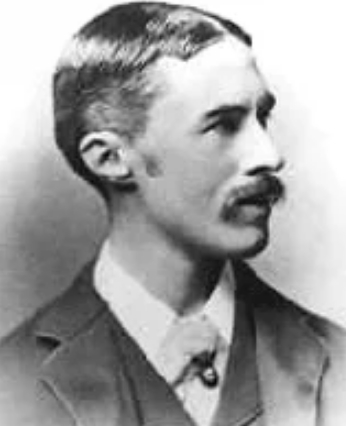
On this date in 1859, Alfred Edward Housman was born in England. He took a “passing degree” from Oxford, and received several university appointments, moving permanently to Trinity College in 1911. His most famous work, a book of poems called A Shropshire Lad, has stayed in print since it was first published in 1896. His second, long-awaited volume of poetry, Last Poems, was published in 1922.
After he died at age 77, his brother put together posthumous collections. Housman’s writing was irreverent: “It is a fearful thing to be The Pope. That cross will not be laid on me, I hope.”
In a letter to his devout Anglican sister Katharine six months before he died, he wrote: “I abandoned Christianity at thirteen but went on believing in God till I was twenty-one, and towards the end of that time I did a good deal of praying for certain persons and for myself. I cannot help being touched that you do it for me, and feeling rather remorseful, because it must be an expenditure of energy, and I cannot believe in its efficacy.” (“The Letters of A. E. Housman,” ed. Henry Maas, 1971) (D. 1936)
THE LAWS OF GOD, THE LAWS OF MAN
The laws of God, the laws of man,
He may keep that will and can.
Not I. Let God and man decree
Laws for themselves and not for me,
And if my ways are not as theirs
Let them mind their own affairs.Their deeds I judge and much condemn,
Yet when did I make laws for them?
Please yourselves, say I, and they
Need only look the other way.
But no, they will not. They must still
Wrest their neighbors to their will,
And make me dance as they desire
With jail and gallows and hell fire,
And how am I to face the odds
Of man's bedevilment and God's?I, a stranger and afraid
In a world I never made.
They will be masters, right or wrong.
Though both are foolish, both are strong.
And since, my soul, we cannot fly
To Saturn nor to Mercury,
Keep we must, if keep we can,
These foreign laws of God and men.— Housman verse included in "Poems of Irony and Wit" online, ed. Michael Dennis Mooney
Robert Frost
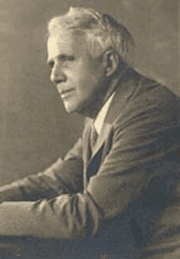
On this date in 1874, Robert Frost was born in San Francisco. His family relocated to New England when his father died. In 1892 he married Elinor White, with whom he was co-valedictorian at Lawrence High School. Although Frost later served as poet in residence and professor of literature at several universities, he never received a degree from Dartmouth or Harvard, both of which he attended.
The Frosts moved to England for a time, where he found success as a poet and was influenced by the work of Rupert Brooke, Robert Graves and Ezra Pound. The couple returned to New England, where his first two books of poetry were published to great acclaim in 1915, A Boy’s Will and North of Boston, followed by many other books of poetry.
Frost was awarded the Pulitzer Prize four times. He was sly about revealing his position on religion, telling freethought encyclopedist Warren Allen Smith that the answer was to be found in his work (see quotes). “Frost never made his beliefs clear, prompting biographers and others to theorize he was, among others, an atheist, a Unitarian, an agnostic and a follower of Swedenborgianism, his mother’s religion.” (University of Buffalo news release, Jan. 18, 2013.)
Jonathan Reichert, whose father was a Cincinnati rabbi who summered with Frost in Vermont, said Frost characterized himself as an “Old Testament Christian,” which Reichert interpreted to mean that Frost “saw that the laws that Judaism had built up really were not the essence, and that Jesus was a great prophet, rather than seeing Jesus as the son of God, or the savior.” (The New Antiquarian, Jan. 30, 2013.) D. 1963.
I turned to speak to God,
About the world's despair;
But to make bad matters worse,
I found God wasn't there.
God turned to speak to me
(Don't anybody laugh)
God found I wasn't there—
At least not over half.The kind of Unitarian
Who having by elimination got
From many gods to Three, and Three to One,
Thinks why not taper off to none at all.— Frost, "Not All There," Poetry magazine (April 1936); Frost, "A Masque of Mercy" (1947)
Keira Knightley

On this date in 1985, Keira Christina Knightley was born in London to a playwright mother and actor father. She had an agent by age 6 and in 1993 had a brief role in an episode of the British TV series “Screen One.” Subsequent TV film roles included Natasha Jordan in “A Village Affair” (1995), a princess in “The Treasure Seekers” (1996), young Judith in “Coming Home” (1998) and Rose in “Oliver Twist” (1999). Knightley earned international recognition for her role as Sabé, the decoy to Natalie Portman’s Queen Amidala, in “Star Wars Episode I: The Phantom Menace” (1999).
She played Robin Hood’s daughter, a starring role, in Disney’s 2001 production of “Princess of Thieves.” In 2002 she acted in a remake of “Doctor Zhivago,” “Pure” and “Bend It Like Beckham.” She starred with Johnny Depp in “Pirates of the Caribbean” (2003), with Emma Thompson, Colin Firth, Liam Neeson and Hugh Grant in “Love Actually” (2003) and with Adrien Brody in “The Jacket” (2005).
Also in 2005, Knightley played Elizabeth Bennet in “Pride and Prejudice,” a role which earned her Golden Globe and Academy Award nominations. She had roles in two 2006 “Pirates of the Caribbean” sequels and was nominated for a Golden Globe and a BAFTA Award for 2007’s “Atonement.” She appeared in “The Edge of Love” (2008) and “The Duchess” (2008).
Roles followed in “Last Night”and “Never Let Me Go” (both in 2010), “A Dangerous Method” (2011), “Seeking a Friend for the End of the World” (with Steve Carell in 2012), “Anna Karenina” (2012), “Begin Again” (2013), “Jack Ryan: Shadow Recruit” and “The Imitation Game” (2014) and “Pirates of the Caribbean: Dead Men Tell No Tales” (2017). She was nominated for a Laurence Olivier Award for Best Supporting Actress for her performance on the London stage in “The Misanthrope,” her theatrical debut.
In addition to her acting life, Knightley has used her celebrity to raise funds and awareness for Amnesty International, WaterAid, the American Library Association, Comic Relief, Women’s Aid and The Spinal Muscular Atrophy Trust. She married musician James Righton in 2013. Their daughter, Edie, was born in 2015.
Knightley: If only I wasn’t an atheist, I could get away with anything. You’d just ask for forgiveness and then you’d be forgiven. It sounds much better than having to live with guilt.
David Cronenberg: Yeah, but you could always lie about being an atheist. I don’t think an atheist could get elected in America right now.
Knightley: No, I don’t think they could either.— Knightley, Interview magazine (April 2012)
Edward Sorel
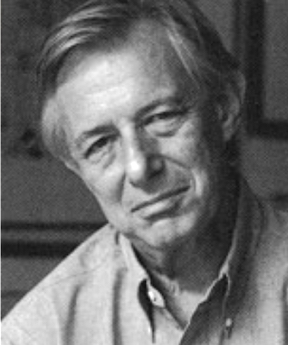
On this date in 1929, illustrator, artist and satirist Edward Sorel was born in Bronx, N.Y., to Morris and Rebecca (Kleinberg) Schwartz. He packs a lot of punch with few, and very often, no words. Look at Sorel’s “Pass the Lord and Praise the Ammunition” from 1967, for example. The color halftone poster, on display at the Smithsonian Institution’s National Portrait Gallery, depicts New York Cardinal Francis Spellman in clerical garb and Army boots on the advance, wielding a rifle with fixed bayonet.
The conservative Catholic cardinal had been military vicar general of the U.S. armed forces since 1939 and was an outspoken hawk on the Vietnam War. By 1967 he was out of step with many Americans. Just as Sorel was finishing the poster, Spellman died, so he waited till 1972 to use the image for the cover art of his book “Making the World Safe for Hypocrisy.”
Sorel is a regular contributor to The Atlantic and The New Yorker and many other publications. Besides his 41 covers for the latter, his art has appeared on the covers of The Atlantic, Harpers, Fortune, Forbes, The Nation, Esquire, American Heritage and The New York Times Magazine. He has illustrated many children’s books, three of which he also wrote. “Unauthorized Portraits,” a collection of his works, was published by Knopf in 1997.
He is a recipient of the Augustus St. Gaudens Medal for Professional Achievement from The Cooper Union, the Hamilton King Award from The Society of Illustrators, the Page One Award from the Newspaper Guild, the Best in Illustration Award from the National Cartoonists Society, the George Polk Award for Satiric Drawing and the “Karikaturpreis der deutschen Anwaltschaft” from the Wilhelm Busch Museum in Hanover, Germany. In 2001 the Art Directors Club of New York elected him to its Hall of Fame.
Sorel graduated from the Cooper Union in 1951 and co-founded Push Pin Studios with Milton Glaser and Seymour Chwast in 1953 before embarking on a very successful freelance career. In a 1997 interview, he was asked what issues he felt especially strong about and was inspired to address. He answered, “I’m one of those who regard organized religion as a dangerous force. I try whenever possible to do anti-clerical cartoons. The only place that will print them is The Nation, which has a very small circulation and pays almost nothing.” (The Atlantic, Nov. 6, 1997)
Sorel, sitting for a joint interview with fellow artists Jules Feiffer and David Levine in 2003, was asked about earlier saying he hated the Bush administration and Saddam Hussein. “All I said was that we have our religious fanatics fighting their religious fanatics, which leaves me without a side to root for,” he replied.
In 1998 the National Portrait Gallery in Washington, D.C., devoted several rooms to an exhibition of his caricatures. The introduction to the “Unauthorized Portraits” exhibit said Sorel’s “potent spoofs of public figures … skewered pomposity wherever it appeared or simply mused on the exquisite oddness of the human comedy.”
The exhibit had three sections — history, entertainment and the arts and politics: “From Moses leading his kvetching people (‘Some miracle! If I don’t get pneumonia, that’ll be a miracle’) through the parted Red Sea waters, to George Gershwin teaching Fred Astaire a dance step, to Madonna seen as a ‘horseperson of the apocalypse.’ ” Below, he reimagines da Vinci’s “The Last Supper.”
Sorel’s “The Last Flossing” (1992)
—
